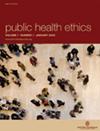我们不应该使用随机程序来分配稀缺的救生资源
IF 2
3区 哲学
Q2 ETHICS
引用次数: 4
摘要
在最近的哲学、医学和公共卫生政策方面的文献中,提出了许多有影响力的论点来支持使用随机化程序(RAND)来分配稀缺的救生资源(SLSR)。在本文中,我对这些论点进行了系统的分类和批判性的评价。我认为,这些论点证明使用兰德公司分配SLSR的情况比他们的支持者所坚持的要少,而且相关的决策者通常应该将SLSR直接分配给对这些资源有最强烈要求的个人,而不是使用兰德公司来分配这些资源。本文章由计算机程序翻译,如有差异,请以英文原文为准。
We Should Not Use Randomization Procedures to Allocate Scarce Life-Saving Resources
In the recent literature across philosophy, medicine and public health policy, many influential arguments have been put forward to support the use of randomization procedures (RAND) to allocate scarce life-saving resources (SLSR). In this paper, I provide a systematic categorization and a critical evaluation of these arguments. I shall argue that those arguments justify using RAND to allocate SLSR in fewer cases than their proponents maintain and that the relevant decision-makers should typically allocate SLSR directly to the individuals with the strongest claims to these resources rather than use RAND to allocate such resources.
求助全文
通过发布文献求助,成功后即可免费获取论文全文。
去求助
来源期刊

Public Health Ethics
PUBLIC, ENVIRONMENTAL & OCCUPATIONAL HEALTH-MEDICAL ETHICS
CiteScore
3.10
自引率
9.50%
发文量
28
审稿时长
>12 weeks
期刊介绍:
Public Health Ethics invites submission of papers on any topic that is relevant for ethical reflection about public health practice and theory. Our aim is to publish readable papers of high scientific quality which will stimulate debate and discussion about ethical issues relating to all aspects of public health. Our main criteria for grading manuscripts include originality and potential impact, quality of philosophical analysis, and relevance to debates in public health ethics and practice. Manuscripts are accepted for publication on the understanding that they have been submitted solely to Public Health Ethics and that they have not been previously published either in whole or in part. Authors may not submit papers that are under consideration for publication elsewhere, and, if an author decides to offer a submitted paper to another journal, the paper must be withdrawn from Public Health Ethics before the new submission is made.
The editorial office will make every effort to deal with submissions to the journal as quickly as possible. All papers will be acknowledged on receipt by email and will receive preliminary editorial review within 2 weeks. Papers of high interest will be sent out for external review. Authors will normally be notified of acceptance, rejection, or need for revision within 8 weeks of submission. Contributors will be provided with electronic access to their proof via email; corrections should be returned within 48 hours.
 求助内容:
求助内容: 应助结果提醒方式:
应助结果提醒方式:


